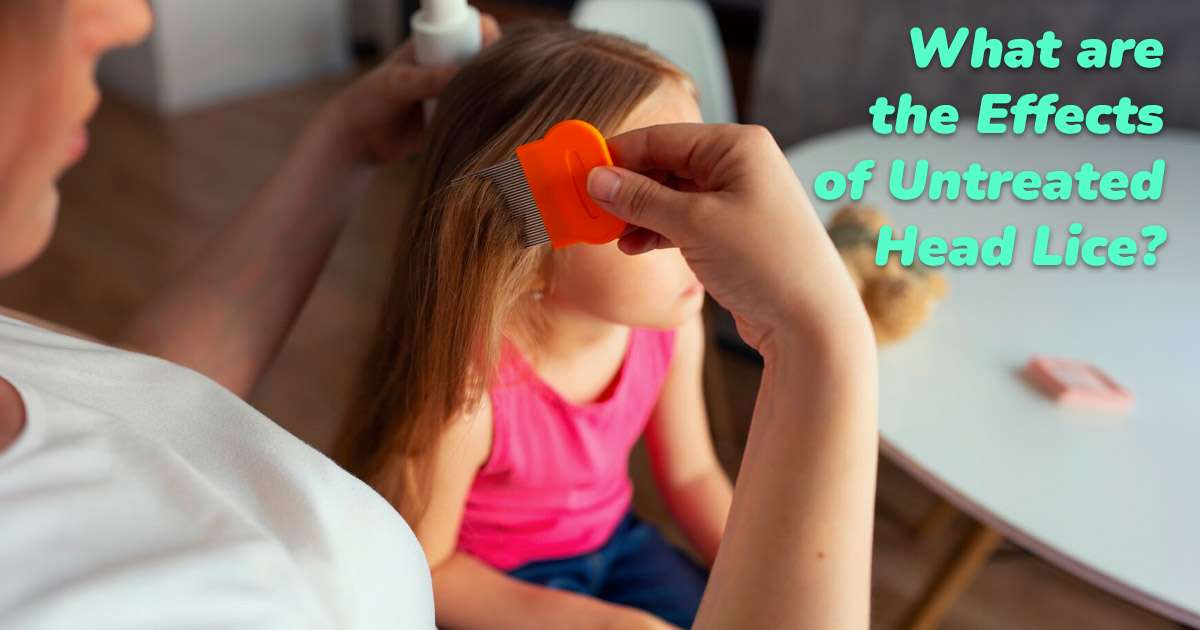Head Lice: What Can Happen if They’re Untreated?

Head lice are annoying bugs that can bother your scalp if you don’t deal with them. In this article, we’ll talk about head lice, what they are, what signs they show, and why it’s not good to ignore them for too long.
What are head lice?
Head lice, or Pediculus humanus capitis, are tiny bugs that live on your scalp and feed on blood. They usually bother kids aged 3 to 11, but anyone can get them. These bugs can make lots of babies fast, laying eggs called nits that stick to your hair near the scalp. Even though they’re small, they can cause big problems if you don’t treat them.
What are the symptoms of head lice?
It’s hard to spot. The main sign is feeling itchy on your scalp, neck, and behind your ears. This itching makes your skin red, and swollen, and sometimes it causes sores from scratching too much.
You might also see adult lice moving around on your scalp or find tiny eggs stuck to your hair. These eggs look like small white or yellowish specks, similar to dandruff. But if you look closely, you’ll see they’re firmly attached to the hair and can’t be brushed away easily.
What happens if you don’t treat head lice?
If you don’t take care of head lice, it can cause big problems. Here’s what might happen if you don’t treat head lice quickly:
- Persistent Discomfort: If you leave head lice alone, the itching and discomfort keep bothering you, making life hard. It might be tough to do everyday things and sleep well, which can make you feel upset and annoyed.
- Skin Irritation and Sores: If you keep scratching your head because it itches, your skin can get irritated, making the discomfort worse. Plus, scratching can make sores on your scalp that hurt, making things even more uncomfortable and causing more problems.
- Risk of Secondary Infections: Scratching too much can hurt your skin, letting bacteria get in and causing infections. One common infection from untreated head lice is called impetigo. It makes red blisters and yellow crusts on your skin, and it’s easy to spread to others.
- Spread to Others: Lice are easy to pass to others, like family or friends, through touch or sharing stuff like hats or brushes. This makes them spread quickly in homes and schools.
- Widespread Infestations: If you don’t deal with head lice right away, they can spread a lot, making it hard to get rid of them. This makes it tough to stop them from spreading, which makes things worse for everyone affected.
Can untreated head lice lead to a serious medical condition?
Head lice usually don’t cause big medical problems, but if you leave them alone, they could cause some issues. Especially if you keep scratching a lot.
- Allergic Reactions: Some folks might have allergies to things in lice saliva, poop, or lice themselves. This can make your skin red, swollen, and itchy, making head lice even more uncomfortable.
- Hair Loss: Head lice themselves don’t make your hair fall out. But all that scratching from the itchiness can break your hair and make it fall out. Lice mainly eats blood from your scalp. Scratching a lot can also mess up your hair roots, which might make your hair fall out in spots for a while.
- Psychological Impact: Having head lice can mess with your feelings, especially for kids. They might feel embarrassed, worried, or not so great about themselves because of all the itching and discomfort. Plus, there’s this idea that having lice means you’re not clean, which can make things even harder.
- Social and Academic Implications: If you have head lice, it can mess with your school and social life, especially if you’re a kid. You might have to stay home from school or skip out on fun stuff with friends until it’s all cleared up. This can make you feel left out and mess up your normal routine.
How do you treat head lice that’s been untreated for a while?
If you’ve had head lice for a while and haven’t done anything about it, it’s time to take action. Here’s what you can do to get rid of those pesky bugs:
- Over-the-counter Treatments: Start by using special shampoos or lotions you can buy without a prescription. These products are made to kill lice and their eggs. To make sure they work well, be sure to follow the instructions carefully. Make sure you cover your whole scalp and hair thoroughly.
- Combing for Removal: After using the special shampoos or lotions, it’s important to comb through your hair carefully with a fine-toothed comb. This helps remove any dead lice and eggs left in your hair. Combining like this helps make sure all the lice are gone and keeps them from coming back.
- Consulting healthcare professionals: If your lice problem is really bad or keeps coming back, it’s a good idea to see a doctor. They can give you stronger treatments or suggest other ways to deal with any skin infections caused by scratching too much.
- Tailored Support: Doctors and nurses know a lot about how to treat head lice. They can give you advice based on your situation to help you get rid of the lice and stop them from coming back.
Don’t let head lice linger
If you don’t treat head lice, it can cause big problems in the long run, like itching, infections, and spreading to others. It’s important to deal with head lice right away to avoid these issues. Don’t worry; some treatments work well, so don’t hesitate to ask for help if you think you have head lice. Acting fast can protect you and others from the effects of untreated head lice.

